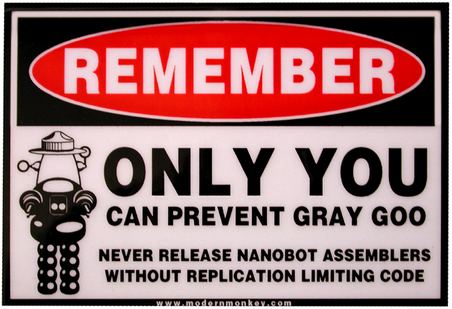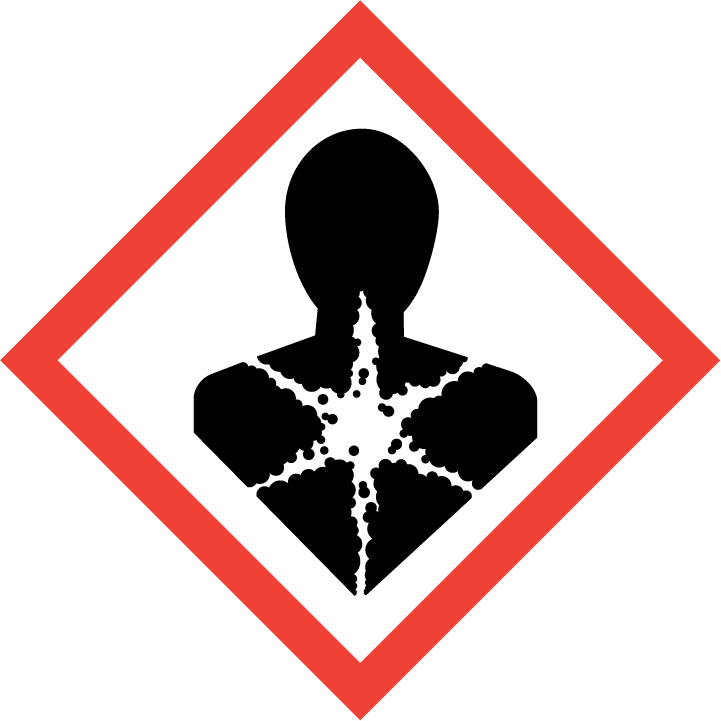A Matt post:
One trend that I find a little disturbing is a growing misunderstanding of chemistry. I have encountered people who range from being wary of synthetic chemicals in the environment (which isn't a bad idea) to being downright militant in insisting that all 'chemicals' are an affront to both humanity and nature and should be banned henceforth. I'd like to take a few minutes to throw in a good word for chemistry and to explain why removing all commodity chemicals from society would be neither desirable nor even feasible.
1) To begin, what is a chemical? To me, a chemical is any substance composed of atoms, which in turn are stable arrays of protons, neutrons, and electrons. By this definition, most of the observable universe is made of chemicals. This includes our planet, our oceans, our atmosphere, and most importantly to us, our bodies which are in essence mobile, self-replicating chemical reactors made of proteins, lipids, and carbohydrates.

I believe that to many people, a chemical is more narrowly defined as a substance that has been prepared artificially, such as in a laboratory. This definition is fine with me, but one should be aware that chemicals made in a laboratory and chemicals found in nature are fundamentally the same. For example, if I were to synthesize Vitamin C in a laboratory, it would have identical properties to Vitamin C found in nature. Regardless of the origin, it would provide the same nutritional benefits.



One trend that I find a little disturbing is a growing misunderstanding of chemistry. I have encountered people who range from being wary of synthetic chemicals in the environment (which isn't a bad idea) to being downright militant in insisting that all 'chemicals' are an affront to both humanity and nature and should be banned henceforth. I'd like to take a few minutes to throw in a good word for chemistry and to explain why removing all commodity chemicals from society would be neither desirable nor even feasible.
1) To begin, what is a chemical? To me, a chemical is any substance composed of atoms, which in turn are stable arrays of protons, neutrons, and electrons. By this definition, most of the observable universe is made of chemicals. This includes our planet, our oceans, our atmosphere, and most importantly to us, our bodies which are in essence mobile, self-replicating chemical reactors made of proteins, lipids, and carbohydrates.
(beware of self-replicating chemical entities)
I believe that to many people, a chemical is more narrowly defined as a substance that has been prepared artificially, such as in a laboratory. This definition is fine with me, but one should be aware that chemicals made in a laboratory and chemicals found in nature are fundamentally the same. For example, if I were to synthesize Vitamin C in a laboratory, it would have identical properties to Vitamin C found in nature. Regardless of the origin, it would provide the same nutritional benefits.


(natural vitamin C) (synthetic vitamin C)
You get it. It's the same thing. Now, someone who has taken organic chemistry will point out that in a gram of synthetic vitamin C (which contains trillions upon trillions of molecules) there are statistically bound to be impurities, regardless of the purification method. This is true, but I'd just like to point out that nature isn't immune to this either, in fact it is often less efficient. In any biosynthesis, there are byproducts. Translation: Any food you eat, no matter how natural the source, has random crap in it, some of which could very well be bad for you, except there's usually not enough for that to happen.
2) Are chemicals dangerous? Yes! Synthetic and natural chemicals alike. Take water for instance. You need it to survive. But too much of it will kill you. I work in a chemistry lab, so I spend much of my time surrounded with bottles with all sorts of funny symbols on them:
This one means "don't get this stuff on your skin or stuff you care about" (corrosive).
To me, this symbol looks like some one getting in touch with their inner self, but in fact it means "don't inhale this stuff" (respiratory hazard).
These chemicals apparently kill fishes and trees (environmental hazard).

This symbol, which means "harmful" or "irritant" usually just gets put on every bottle, no matter how innocuous, because, hell, it's a chemical so it's probably bad for you in some way.
Despite these terrifyingly rendered symbols, the truth is that I don't receive much if any harmful chemical exposure at work. Part of this is due to the proper use of personal protective equipment, such as gloves, goggles, and a fume hood, but part of it is because these chemicals are not as sinister as they are made out to be. What these symbols don't convey is that the danger depends on the type of exposure and the dose. Some nerve agents are lethal in milligram quantities through skin contact. Surprisingly, I don't make these. Some chemicals you could take a bath in and be none the worse for wear--but you probably shouldn't be drinking them.
So are synthetic chemicals inherently bad for you? No! Let me give a shot at a metaphor. Consider the ocean:

(the ocean)
The ocean is beautiful, a source of life, a great place to take a date, but it can also be dangerous, for example, when you are heading full speed through a field of icebergs. Does that mean you stay away? No! Does that mean you go swimming by yourself? No! Just be smart about it.
3) What would life be like without synthetic chemicals? Well, food would be a lot more expensive for one, although it would be a bit more natural I suppose. Would it be healthier? Well, if you only ate Banquet microwave meals, Pepsi, and Snickers, it might be, but this isn't the fault of the chemical additives, it's those dastardly carbohydrates which are quite natural, but a problem if you eat them by the shovel-load. The shelf-life would suck, and without agrochemicals, the resulting hunger wars would probably make for some interesting reading in another galaxy. Would there be less industrial waste in the environment? Well, yes, but that kind of begs the question. Believe it or not, synthetic chemicals show up in a lot more than just groceries and groundwater. The largest production commodity chemicals are polymers, which are produced by the billions of tons. Without these, you wouldn't have any plastic. This would include most of your clothing, all of your appliances, a lot of the building materials in your residence, and most of the junk you keep there. You wouldn't have a car or a computer or a phone, and the internet and global communications wouldn't exist. You wouldn't be able to blog about the evil chemical industry. There wouldn't really be any viable modern manufacturing. Welcome to the nineteenth century. Oh, and metallurgy is technically chemistry, so I guess we are back to caves and rocks.

(plastic for sale)
I'm not trying to say that all chemicals are harmless, or that all chemical manufacturers are guiltless, but seriously, you do not want to live in a 'chemical-free' world.
4) Can chemicals actually be good sometimes? Yes! Metallurgy allowed the construction of the first civilizations. The advent of vaccines and antibiotics caused a substantial increase in life expectancy. (Vaccines were invented by Louis Pasteur, a French chemist, and the first commercial antibiotic was discovered by Gerhard Domagk who worked for the infamous German chemical company IG Farben.)
Believe it or not. Chemistry can save the world. In fact it did already (sorry physics and biology!) In 1798, a man by the name of Malthus published An Essay on the Principles of Population. Malthus described how in a period of exponential population growth, the population can rapidly exceed the available resources (food) leading to a catastrophe that usually involves starvation, war, etc. He didn't predict exactly when humanity would run out of food, but in 1798, Earth hosted approximately 800 million humans, and now we have surpassed 6 billion. Some are inclined to make fun of Malthus, but I think he was right. We should have run out of food by now, but we didn't, and at the moment at least, we do produce enough food to feed everyone, even if geopolitics prevents its full distribution. What happened?
Fritz Haber. That's what happened. In 1905 (which is incidentally the same year Einstein published the theory of special relativity), Fritz Haber figured out how to make ammonia from hydrogen and nitrogen using a heterogeneous iron catalyst.
 (err... maybe this helps?)
(err... maybe this helps?)
Why was this important? Well, in World War I, it allowed Germany to keep making bombs and prolonged aggressions by over a year. BUT AFTER THAT, it was used to make fertilizer. FERTILIZER = FOOD. This was so important that one of the first things the allies requested after the war were plans to build a functioning Haber process plants. (Prior to implementing the Haber process, the United States imported most of its fertilizer in the form of seagull droppings from Peru. That's right, you heard me correctly.) Currently, Haber plants are capable of producing one ton of ammonia per minute. That's a lot of fertilizer. And it feeds more than half of the world.
Now before you get comfortable. Here are some tidbits. Fertilizer runoff is a big problem. I don't know much about it, but apparently it causes algae blooms and such. Also, where does the hydrogen gas come from? Weeeelllll... it actually comes from the water gas shift reaction (see below again):
You see that CO2 thing on the right? Yea... that's carbon dioxide. You know what's making a lot of that carbon dioxide that people are complaining about? It's not your car. It's not even your power plant. It's the Haber plant that is making all of the fertilizer that is allowing the 6 billion people on the planet to survive.
Conclusion? I hope the next time someone feels compelled to attack the chemical industry, they'll remember that it's also what's keeping us alive. Are we slowly dying from chemical poisoning? I don't know, but I do know that prior to the industrial revolution, life expectancy was somewhere around 30 years, and now it's about 70 or so. Are there unsolved problems? Yes. And if you are interested in solving them, become a chemist! (just fyi, jobs are kinda hard to get right now)



No comments:
Post a Comment